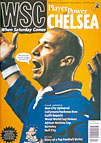 France may be hosting the World Cup on merit, but Cris Freddi examines previous hosts who were chosen for other reasons
France may be hosting the World Cup on merit, but Cris Freddi examines previous hosts who were chosen for other reasons
FIFA started promisingly, awarding the 1930 World Cup to Uruguay, where a coalition of the two strongest parties ‘was able to avert dictatorship’ – then blotted their copybook in spectacular fashion. They handed the second tournament to Italy.
Mussolini’s generally been portrayed as a bit of a fat clown, Alexi Sayle in military gear – but there was nothing uproariously funny about the modern Fascist state, where opposition parties had been dissolved, arrests without trial were the norm, and the Socialist deputy Giacomo Matteotti had been murdered after making a parliamentary speech about the rule of force. Mussolini had been in power since the March on Rome in 1922, a full decade before Hitler – so FIFA could hardly claim blissful ignorance.
In fact they must have had reservations: it took them eight meetings to make up their minds. Maybe they eventually decided that human rights might have to be swept under the carpet for a while, but at least the tournament would run on time. All grist to the Duce’s propaganda mill.
The effects were felt on the pitch too. Italy won three matches in a row by bundling the ball in after barging the opposition goalkeeper. One referee was suspended by his own federation and another was seen with Mussolini just before the Final, in which he allowed Italy’s winner despite Meazza’s handball. A really bad taste in the mouth.
The 1950 tournament should have left the same, given that Getulio Vargas was Brazil’s dictator for over twenty years. But he seems to have held some kind of weird middle ground, outlawing Communists and Fascists alike and wooing the workers with social legislation, so the situation’s a bit unclear, to me anyway. Plus the football was so exciting and Brazil so far away, it was possible to gloss over it.
Much the same happened in 1970, just two years after two hundred peaceful protesters had been murdered by the army in Mexico City. That was the summer of ’68, when students had occupied the Sorbonne and rioted in Grosvenor Square without being machine-gunned to death – but perhaps Europeans decided that Latin America had its own way of doing things and should be allowed to get on with it. So the Olympics were allowed to take place in Mexico, followed with indecent haste by the World Cup. It gave us the Italy-West Germany semi and a famous Brazilian forward line – but the price, in human terms, was a rip-off.
Same goes for the second time Mexico was chosen as host, in 1986. First FIFA raised a few eyebrows by awarding it to Colombia, who surprised nobody by dropping out, as did Brazil. Then the USA and Canada were allowed to make bids, but the venue may already have been decided by then.
Tongues wagged when it came to light that one of FIFA’s vice-presidents, Guillermo Cañedo, was a leading executive with the private Mexican television company Televisa. Asked about the prohibitively high ticket prices, Cañedo replied that “people always have TV”. FIFA president Havelange said his conscience was clear and “other people may write or say what they like”. What many wrote and said (even those from Thatcher’s Britain) was how shocked they were by the ongoing gulf between Mexico’s rich and poor. Havelange had no convincing answers when asked why FIFA simply didn’t fill the empty seats with needy children (mind you, nor did the English FA when asked the same thing during Euro ’96). A tournament poisoned by Maradona’s handball had Camel cigarettes as a major sponsor. The usual whiffs in the corridors of power.
But even Mexico can’t match the horrors of ’78, when FIFA let Argentina carry on as hosts even after the latest military coup. They might have pleaded shortness of time, but the major European countries had all the infrastructure in place and could have taken over at short notice.
Instead, the Argentinian junta were allowed to spend the enormous sums needed to build three new stadia and police the event in their inimitable fashion. Amnesty International sent documentation on state atrocities to journalists setting out for Buenos Aires, but football has never had much trouble ignoring that kind of thing.
The most obscene tableau was saved till the end, Passarella (‘the dirtiest great player in the world’) receiving the trophy from the hands of General Jorge Rafael Videla, which had blood on them. Estimates vary, but perhaps ten thousand people were tortured and killed, with the tactic approval of some high clergymen in Buenos Aires. The Mothers of the Plaza de Mayo, protesting day after day about the disappearance of their sons, were glad the World Cup had been staged in Argentina, but only because it brought them to the notice of the world. The tournament was vivid and unforgettable, but then so are electrodes on the tongue and testicles.
France ’98 won’t be like that, held in a country where the idea of citizenship is prominent in the constitution. Mind you, they’re happy enough to keep detonating weapons of mass destruction under islands inhabited by dark-skinned peoples. The day they test nuclear devices near Paris, start buying the wine again.
From WSC 134 April 1998. What was happening this month